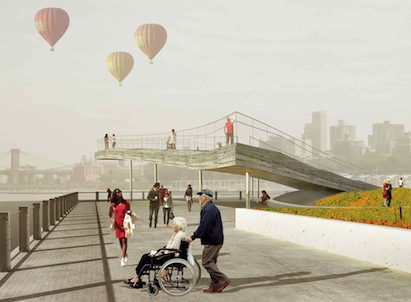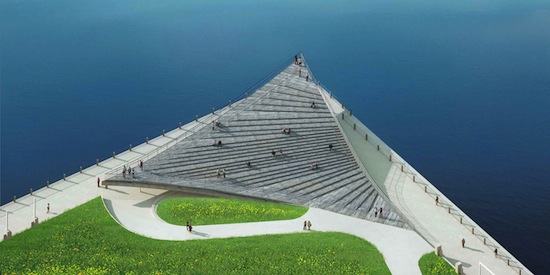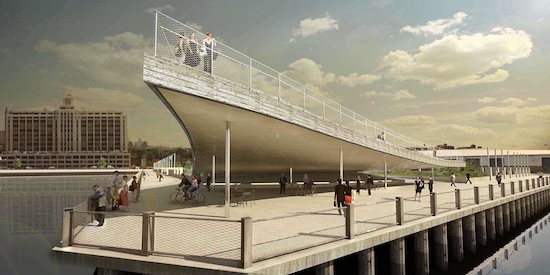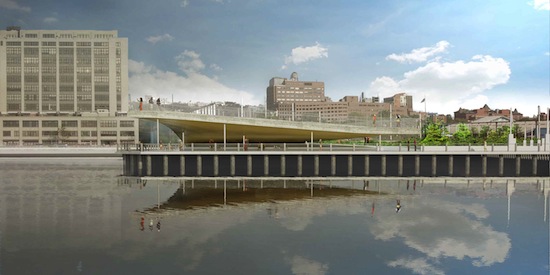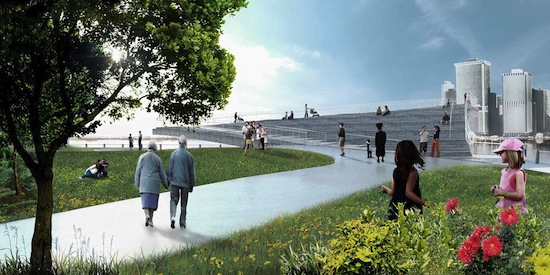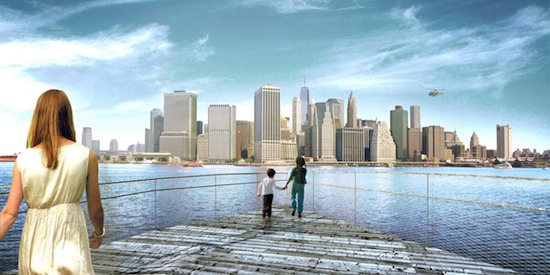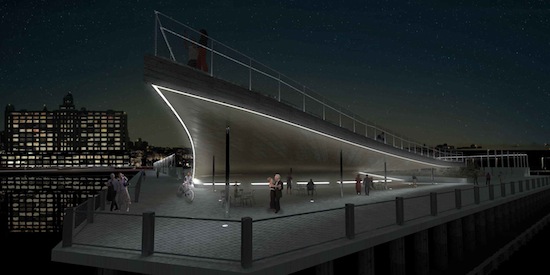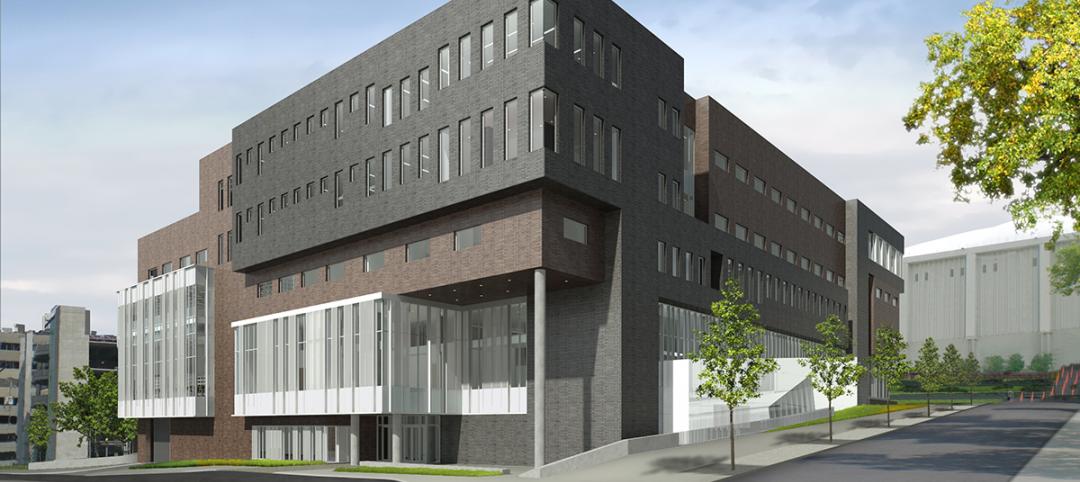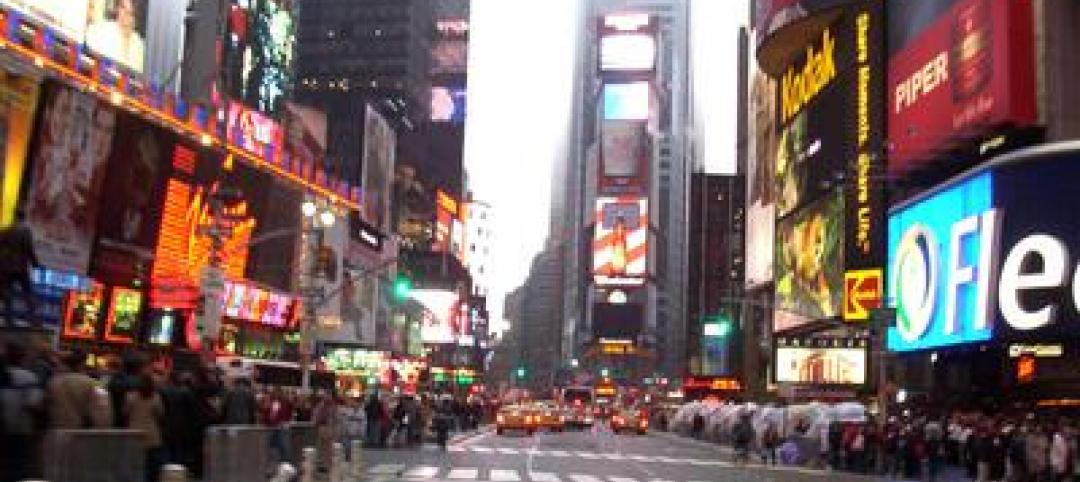BIG’s proposal for Brooklyn Bridge Park, a project that has revitalized the New York City waterfront, consists of a 6,000 ft2 (560 m2) triangular cross-laminated timber structure, serving both as pavilion and platform. Sloping upwards 17.5 feet (5.3 m) in height from the foot of the large gathering lawn, the platform provides magnificent views of the surrounding harbor, the Statue of Liberty, the Manhattan skyline, and the Brooklyn Bridge. In conjunction with the adjacent greenery, Pier 6 will be dominated by a flower field and treed areas giving the area seasonal displays of color.
The surface of terraced stairs, softly illuminated, will allow for large and small events and is fully ADA accessible. The pavilion, supported by thin steel columns, is brightly lit with up-lights and provides shade, shelter and space for indoor activities. Movable site furniture underneath the platform will accommodate a variety of programs, from food carts and picnicking to community events and small performances.
Bjarke Ingels comments: “The Mantaray is a small public platform at the end of the pier - equally accessible above and below. Its namesake organic slopes and curves have been shaped by concerns for accessibility, safety, shelter, structure - like a manmade reef evolved to accommodate human life.”
“This spectacular structure will provide much-needed shade and a unique space for public events, while offering a dramatic ascent to the water’s edge,” said Regina Myer, President of Brooklyn Bridge Park. “We are so pleased with the collaboration between Michael Van Valkenburgh’s landscape design for the southern portion of the park, and Bjarke Ingels’ design for a breathtaking architectural addition that provides a truly special moment on the waterfront.”
BIG was selected as winner of the project in Spring 2013. The collaboration between MVVA and BIG has evolved into a fruitful partnership where pavilion and landscape design inform and inspire each other. The project won the unanimous approval of the Community Board’s executive committee, as well as from the city’s Public Design Commission.
About Pier 6
Pier 6, located at the intersection of Furman Street and Atlantic Avenue, spans over 1.6 acres (6500 m2) and offers a diverse array of amenities, including sand volleyball courts, concessionaires, themed playgrounds, a dog run, plantings, and the seasonal Governor’s Island Ferry connecting Brooklyn and Governors Island.
About BIG
BIG – Bjarke Ingels Group is a leading international partnership of architects, designers, builders and thinkers operating within the fields of architecture, urbanism, research and development. BIG is led by partners – Bjarke Ingels, Andreas Klok Pedersen, Finn Nørkjær, David Zahle, Jakob Lange, Thomas Christoffersen and Managing Partners, Sheela Maini Søgaard and Kai-Uwe Bergmann – with offices in Copenhagen and New York. In all our actions we try to move the focus from the little details to the BIG picture. www.big.dk
About MVVA
MVVA- Michael van Valkenburgh Associates is a landscape architecture firm that creates environmentally sustainable and experientially rich places across a wide range of landscape scales, from city to campus to garden. With offices in Brooklyn, New York, and Cambridge, Massachusetts, and a staff of 65, MVVA approaches design and planning as a creative collective. www.mvvainc.com
COLLABORATORS
Michael Van Valkenburgh Associates (Landscape Design), Knippers Helbig (Structure), Tilotson Design Associates (Lighting Design), AltieriSeborWieber (MEP), Pantocraft (Code), Formactiv (Expediter)
Related Stories
| Dec 27, 2011
Suffolk Construction celebrates raising of Boston Tea Party Ships & Museum cupola
Topping off ceremony held on 238th Anniversary of Boston Tea Party.
| Dec 27, 2011
State of the data center 2011
Advances in technology, an increased reliance on the Internet and social media as well as an increased focus on energy management initiatives have had a significant impact on the data center world.
| Dec 27, 2011
USGBC’s Center for Green Schools releases Best of Green Schools 2011
Recipient schools and regions from across the nation - from K-12 to higher education - were recognized for a variety of sustainable, cost-cutting measures, including energy conservation, record numbers of LEED certified buildings and collaborative platforms and policies to green U.S. school infrastructure.
| Dec 21, 2011
DOE report details finance options for PV systems in schools
The report examines the two primary types of ownership models used to obtain PV installations for school administrators to use in selecting the best option for deploying solar technologies in their districts.
| Dec 21, 2011
Few silver linings for construction in 2012
On the brighter side, nearly half of respondents (49.7%) said their firms were in at least “good” financial health, and four-fifths (80.2%) said their companies would at least hold steady in revenue in 2012.
| Dec 21, 2011
Hoboken Terminal restoration complete
Restoration of ferry slips, expanded service to benefit commuters.
| Dec 21, 2011
BBI key to Philly high-rise renovation
The 200,000 sf building was recently outfitted with a new HVAC system and a state-of-the-art window retrofitting system.
| Dec 20, 2011
Gluckman Mayner Architects releases design for Syracuse law building
The design reflects an organizational clarity and professional sophistication that anticipates the user experience of students, faculty, and visitors alike.
| Dec 20, 2011
Research identifies most expensive U.S. commercial real estate markets
New York City, Washington, D.C. and San Mateo, Calif., rank highest in rents.


